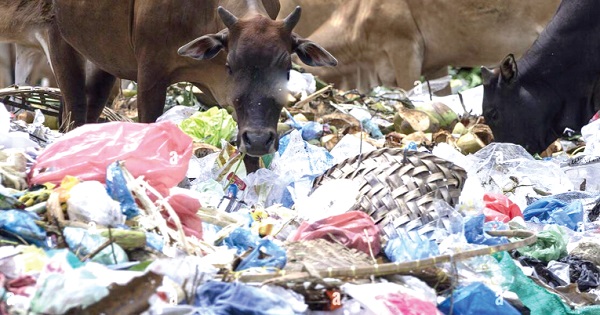
Transitioning from bans on single-use plastics to plastic circular economy
Plastics are polymers and have varied applications owing to their lightweight, ease of processing, low cost and flexibility. Single-use plastics (SUPs) are easily discarded after their primary use. They have applications in products, such as straws, wrappers, carrier bags and beverage bottles.
The wastes are mismanaged and they pollute the land and ocean environment. For instance, Tan et al., 2021 reported that over 17 million tons of plastic wastes were openly dumped by Sub-Saharan Africans in 2019, which is equivalent to the weight of 9.4 million mature bulls.
Advertisement
These plastic wastes were found to be burnt in the open, dumped in drains, and in mismanaged landfills, which polluted the environment. Toxins from the burning were subsequently transferred to humans through free-range animal vectors such as chicken, cattle and goats who feed at the landfills and burning sites.
An example is reported by Kairu in 2020 that eggs from free-range chickens at plastic burning sites in Tanzania and Kenya were found to be 10 and five times respectively richer in cancer-causing dioxin persistent organic pollutants than the European Union standard, which will be passed on to human consumers.
Bans
According to a report by KiBii, in 2021, 62 per cent of governments across Africa introduced partial or full bans on plastics in an attempt to control the menace. The countries implemented policies to ban the importation, manufacture and use of SUPs.
Some examples are reported; Behuria in 2021 explained that Rwanda's ban on plastics ensured the importation, manufacture and use of plastic packaging received permission from government officials, otherwise a jail term of six months to one year for defaulters.
Similarly, Goitom in 2017 described the Kenyan ban as one that imposed fines of not less than US$19,417, but not more than US$38,835 or prison terms between one and four years to persons convicted of importing or manufacturing plastic bags for commercial and domestic use.
The National Environment Management Authority of Uganda reported the 2021 enforcement of a 2019 legislation that banned plastic bags with thicknesses below 30 microns and imposed prison terms for non-compliant manufacturers and importers.
However, Kobo in the 2021 report indicated that the outright ban on SUPs induced a consequential socio-economic disruption in the countries.
Absence
In the absence of replacement alternative materials such as papers, fabrics or other biodegradables, the bans on plastics negatively affected small and medium-scale enterprises in the plastic value chain with a drop in revenue.
This forced people to rely on other non-biodegradable products such as glass for packaging beverages and water, which lead to an increase in pricing for goods and services, declined the demand for packaged products, increased job losses and slowed down the economy, Sussman noted two years ago.
Furthermore, Tollefson, in his 2022 report indicated that when demand for packaging materials shifts from plastics to paper there would be a potential worsening of the venerable situation in Africa whose limited resources were overstretched in implementing climate change adaptation measures, since more trees would be cut to meet the demand for paper packaging.
Also, the outright ban on SUPs had the potential to reduce food security and expose the poor and marginalised to a high cost of living and starvation, as current alternatives become more expensive to afford, noted by Molloy et al in a recent report.
Challenges
In view of these bans on African SUPs, there have been implementation challenges with resistance from manufacturing companies and consumers. For instance, Knoblauch et al., 2018 reported weak implementation of Burkina Faso’s ban due to a lack of substitutes and stakeholder resistance.
Similarly, Nyathi and Togo 2020, reported enforcement challenges in Ethiopia, Malawi, Niger, Morocco, Tanzania, the Democratic Republic of Congo, and Cote d’Ivoire.
Kenya Association of Manufacturers challenged legislation that banned SUPs based on job losses and collapse of their businesses, however, the suit was dismissed to favour environmental protection as reported by Nyathi & Togo, 2020.
The bans primarily targeted the protection of the environment, with minimal consideration towards positive behavioural changes of SUPs users, hence the consequential ineffectiveness over time.
For instance, Adeyanju et al., 2021 reported that South Africans and Batswana temporarily reduced the use of SUPs in the first three and 18 months of the bans respectively, which demonstrated a positive change in user behaviour, however, the change was short-lived.
Gap
To bridge the gap between effective management of SUPs and social support in Africa, it is imperative for countries to adopt a plastic circular economy that provides sustainable measures as prescribed by the London-based Ellen Macarthur Foundation, in 2017.
The circular economy considers closing the loop in the plastic value chain and recommends innovative and profitable use of plastics after a single use to prolong the life cycle and reduce waste.
The Foundation estimates potential gains in the global implementation of a circular economy of plastics by 2040 to include a decline in ocean pollution by 80 per cent, provision of 700,000 net employments, and annual savings of USD 200 billion.
It is, therefore, praiseworthy for African countries to adopt the plastics circular economy through enhancement in the production and use of sustainable alternative materials to plastics, encouragement of innovative redesigning of plastic products to be recyclable, promoting plastics recovery and reuse, and investment in research and innovations to prolong the economic life cycle of plastics to eliminate waste and pollutions.
The writer is a Research Scientist, Council for Scientific and Industrial Research (CSIR) – Institute of Industrial Research (IIR), E-mail: [email protected]



